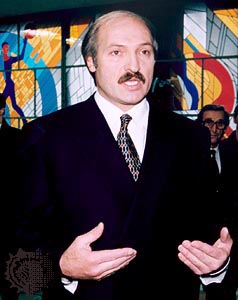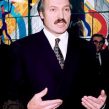
RELEASE OF POLITICAL PRISONERS IN BELARUS SPARKS DEBATE
Publication: Eurasia Daily Monitor Volume: 5 Issue: 35
By:

Over the past two weeks Belarus has released a large group of “political prisoners” from jails and camps across the country. They include activists, politicians, and some of the entrepreneurs who were arrested when protesting the restriction of their activities through new state laws. Significantly, former presidential candidate Alyaksandr Kazulin remains in captivity, but the apparent moderation of the regime’s stance has fueled hopes that there could now develop a dialogue between the Lukashenka regime and Belarus. Thus in a late January interview with Belapan, Christiane Hohmann, spokesperson for European Commissioner for External Relations and European Neighborhood Policy Benita Ferrero-Waldner, commented that progress in democratization would be the key determinant of better relations between Belarus and the European Union.
The most recent high-profile release is that of Andrei Klimau, who was released from Mazyr penal colony #20 on February 15. A former parliamentary deputy, he was arrested last April for violating Article 361, Part 3 of the Criminal Code, which concerns public appeals to remove the existing government. While in Minsk remand prison, Klimau suffered a heart attack and the sentence handed down to him – two years in a strict-regime camp – was concealed from the public for several weeks. He has also spent time in prison on prior occasions and has been one of the most active opponents of President Alyaksandr Lukashenka.
Interviewed about the conditions of his release, Klimau rejected any ideas that the regime had responded to any mercy plea. He noted that the relaxing of tension between the authorities and the opposition was a positive step that will “bring us closer to the European Union and offer open opportunities for dialogue.” Other figures recently released include activist Andrei Kim, who was detained at the rally on behalf of the entrepreneurs, and Zmitser Dashkevich and Artur Finkevich, both high-profile Young Front leaders. One of their colleagues, Paval Sevyarinets, commented that Finkevich’s release was geared toward appeasing the EU while arrests of lesser-known figures continued apace.
The releases have led to a new focus on Kazulin, who was sentenced to five and a half years of imprisonment in July 2006 after a protest rally to release prisoners detained after a large protest against the undemocratic nature of the presidential elections held the previous March. Kazulin subsequently went on hunger strike, which has reportedly resulted in irreversible damage to his health. A former rector of the Belarusian State University, Kazulin was the candidate most feared by Lukashenka, and he ridiculed the president during his two allocated 30-minute segments on national television during the electoral campaign. Amnesty International subsequently designated him as a political prisoner.
According to Kazulin’s wife, Irina, the terms offered by the government for her husband’s release are a “shameful escape from the country.” His daughter Yulia noted that he has not been offered an amnesty. A recent analysis in the newspaper Belorusy i Rynok was skeptical of what is an apparent policy of releasing of political prisoners as bargaining chips in negotiations with Europe. Thus although the Belarusian side does not recognize the existence of political prisoners in the country, the president was able to take “an unprecedented step of goodwill.” On February 12, speaking to students at the Belarusian State University, Lukashenka maintained that his government had fulfilled the first requirement, to improve relations with the EU. However, Kazulin remains in prison because, in the words of one critic, “freedom must be sold at the most expensive price.” A major figure has to remain incarcerated for future gains.
A similar position was taken by one of the leaders of the European Belarus movement, Mikola Statkevich, during a visit to Sweden on February 11-14. Statkevich pointed out that the essence of the Lukashenka regime has not changed, no new laws have been issued, the parliament is still not elected on a democratic basis, the press is not free, and the courts are not independent. Others have commented also that despite the release of prominent prisoners, the Belarusian authorities have taken no steps to meet the EU’s demands in other areas – specifically the so-called 12 requirements for democratization.
So how does one explain the latest moves by the artful president? And when will Kazulin be released? Should the EU respond positively to these maneuvers? For Lukashenka, the past two years have seen significant moves away from the Russian orbit. Though he may have hopes for better relations with the new Russian president after March 2, there are no indications thus far that the predicted victory for Dmitry Medvedev will bring significant changes to the cold relationship. Therefore the president hopes to gain concessions from the EU.
Realistically, dialogue may be as appropriate a way to deal with Lukashenka as isolation, but the regime is unlikely to evolve in any significant way. In fact, the manipulation of incarcerated prisoners for political gains seems as cynical as any of the president’s earlier policies. Lukashenka has not conceded very much, and little can be expected in the way of real democratization, which is fundamentally alien to his regime. As for Kazulin, there are various pros and cons of authorizing his early release, but he is now the chief pawn in the president’s chess match with Brussels and is part of the endgame rather than the initial negotiations.
(Belorusy i Rynok, February 18; www.charter97.org, February 15; Associated Press, February 13; Belorusskie novosti, January 30)




